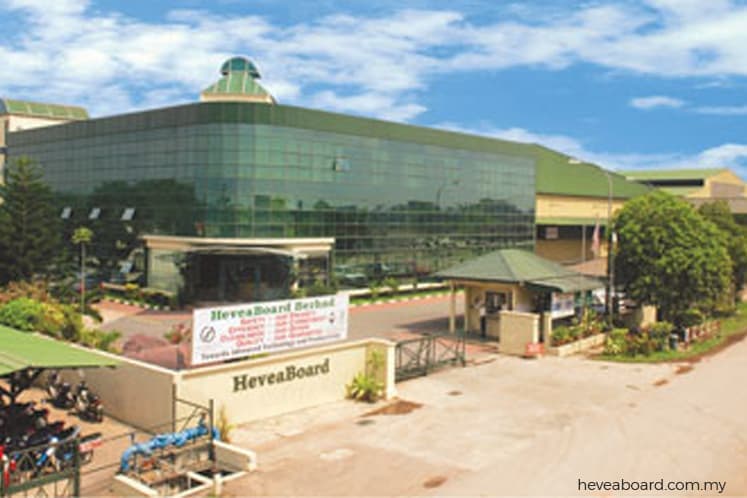
This article first appeared in The Edge Financial Daily on September 5, 2017
KUALA LUMPUR: While most would expect the rubber wood export ban to benefit wood-based furniture manufacturers, including particle board makers, HeveaBoard Bhd managing director Yoong Hau Chun, however, describes such view as “misconception”.
HeveaBoard’s share price staged a rather strong rebound at end-June on news of the export ban on rubber wood, soaring to a record high of RM1.75 on Aug 7 from this year’s low of RM1.30.
Given the headwinds the particle board is facing, HeveaBoard might find it hard to keep up with investors’ expectations.
Yoong acknowledges that HeveaBoard, which saw a 45% to 50% hike in rubber wood cost since early this year, is expecting a tough ride to sustain its profit growth for the financial year ending Dec 31, 2017 (FY17).
“To be honest, it will be very tough [to see growth in our bottom line]. Our internal plan is to have growth in both top line and bottom line. But this year, there’s the impact on the raw material and the [foreign] worker issues,” Yoong told The Edge Financial Daily in an interview.
HeveaBoard sees no impact from the export ban on rubber wood [sawn timber] mainly because the company consumes rubber wood [logs] as raw materials. And that log export has been banned a long while ago.
He also explained that the rainy weather has affected rubber wood supply, which caused prices to climb.
Yoong noted that the sharp rise in rubber wood cost certainly does not bode well for HeveaBoard as rubber wood makes up 30% of the particle board’s raw material costs.
As an export-oriented company, Yoong said the stronger ringgit also affects the company negatively as it mainly trades in US dollars.
Moreover, Yoong noted that HeveaBoard will be continuing to focus on higher-grade products as they provide a higher profit margin.
“We have been trying to move away from the conventional products that can give us an edge over the rest of the competitors,” said Yoong.
He explained that HeveaBoard is now commercialising a new product — the NAF, which is a particle board with no added formaldehyde adhesive system. “This is a totally new type of product that we are able to offer,” said Yoong, adding that there is no other manufacturer that produces this product in Malaysia.
Incorporated in 1993, the company now manufactures, trades and distributes a wide range of particle boards and particle board-based products as well as ready-to-assemble (RTA) furniture products.
HeveaBoard’s main revenue streams come from particle board manufacturing, with 80% of total production exported. Meanwhile, about 90% of its RTA is exported.
For the particle board segment, the company exports about 48.4% to China, India (12.2%), Japan (11.8%), Korea (11.7%), and other countries (5.6%) and 10.4% is sold to the local market.
Meanwhile, for the RTA segment, HeveaBoard exports to Japan (63%), Australia (14%), Europe (13%), and other countries (8%), as well as the US (2%).
Earnings-wise, HeveaBoard’s net profit grew 17.5% to RM41.63 million, from RM35.43 million a year ago for the first six months ended June 30, 2017. Its revenue was up 9.83% to RM293.98 million during the period, from RM267.68 million a year ago.
The increase in net profit was mainly due to the better revenue in the particle boards segment, driven by higher production capacity, increased sales of higher-grade products, increased sales in value-added products.
However, HeveaBoard saw a decline in net profit from the RTA segment due mainly to lower exchange rate for the US dollar to ringgit and higher raw material cost.
While the company has been expanding its production line, increasing more automation to reduce labour usage and increase efficiency, like any labour-intensive industries Yoong highlighted that the lack of labour force is another concern for HeveaBoard.
“No matter how much of automation that we have, we still need the workers to operate and maintain the machines. “The bottleneck [now] is how much we could produce,” said Yoong.
Going forward, HeveaBoard is seeking to add value to its existing core business by venturing into cultivation of gourmet fungi, through its new wholly-owned subsidiary HeveaGro Sdn Bhd.
With the company currently producing 100 tonnes of low-quality raw materials daily, which are currently sold to boiler users at a discount, Yoong said the company plans to utilise its existing waste for King Oyster mushroom cultivation.
“It (mushroom cultivation) not going to be a very big revenue [or] profit generator, but I think, on the margin side, it’s quite attractive because we are able to use our own raw materials. I also think that there’s a very good prospect for healthy food [and] organic produce,” said Yoong.
While HeveaBoard has allocated about RM10.5 million for factory and equipment to cultivate King Oyster mushroom, Yoong said the company is aiming for a RM10 million revenue and RM3 million profit for FY18.
Yoong said the factory should be ready by year end and HeveaBoard is hoping to start production in the first quarter of 2018.